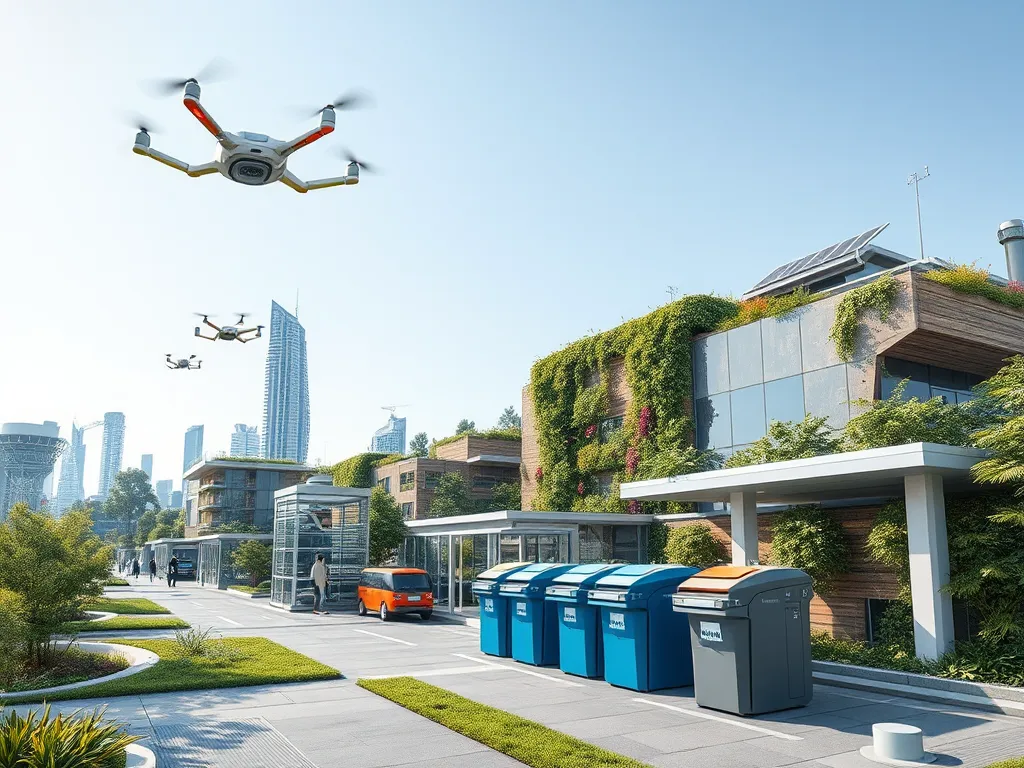Innovative Approaches to Future Waste Management Trends

The Future of Waste Management: Innovations and Strategies for a Sustainable Future
As the world grapples with increasing urbanization and a burgeoning population, the importance of future waste management has never been more pronounced. Effective waste management practices are essential for reducing landfill use, minimizing environmental pollution, and conserving natural resources. The future of waste management will involve embracing advanced technologies, sustainable practices, and collaborative policies that prioritize ecological health and community engagement.
In the context of future waste management, several key trends are expected to emerge. These include a shift towards a circular economy, the implementation of zero-waste initiatives, and the smart utilization of technology to optimize waste collection and processing. Each of these trends not only aims to reduce the volume of waste produced but also seeks to redefine our relationship with waste as a valuable resource rather than a discarded burden.
Sustainable practices are at the core of future waste management strategies. By adopting sustainable methods like recycling, utilizing biodegradable materials, and implementing circular economy principles, communities can significantly reduce their waste footprint. Furthermore, policies that encourage these sustainable practices are essential for creating a holistic approach to waste management that aligns with environmental conservation goals.
The integration of technology in waste management is pivotal for improving efficiency and outcomes. Innovations such as smart bins equipped with IoT sensors enable better tracking of waste disposal patterns, while AI and machine learning can enhance waste sorting processes. Moreover, adopting waste-to-energy technologies can convert waste into valuable energy resources, addressing energy needs while mitigating landfill overflow.
Finally, public awareness and education play a crucial role in shaping positive behaviors towards waste management. By fostering community involvement, promoting educational programs, and leveraging social media platforms, the dialogue surrounding future waste management can expand beyond policy-level discussions, engaging citizens as active participants in the transition towards sustainable practices.
Sustainable Practices in Future Waste Management
Advancements in recycling technologies are pivotal in the future waste management landscape. Enhanced sorting mechanisms and improved recycling techniques can recover more materials from the waste stream, making recycling a more efficient process. This not only helps reduce landfill use but also increases the supply of recycled materials, supporting industries that depend on them.
Zero-waste initiatives aim to redesign the lifecycle of resources, emphasizing conservation, reduction, and reuse. Communities are increasingly adopting zero-waste goals to minimize waste output and promote sustainable consumption patterns. Implementing these initiatives can lead to significant reductions in waste generation, fostering a culture focused on sustainability and resource efficiency.
The use of biodegradable materials is gaining traction as a sustainable alternative to conventional plastics. These materials break down naturally, reducing pollution and landfill mass. Future waste management will likely see increased regulation on single-use plastics, promoting the adoption of biodegradable options that positively impact the environment.
For innovative strategies in waste management, explore insightful resources available on Green.org.
Circular economy models are emerging as transformative frameworks in future waste management strategies. By envisioning waste as a resource, circular economies emphasize closing the loop through reuse, recycling, and refurbishment. This approach not only mitigates waste production but also incentivizes innovation in product design and material use.
The Role of Technology in Waste Management
Smart bins equipped with IoT technology offer a revolutionary approach to waste tracking and management. These bins can monitor waste levels and optimization routes for collection trucks, reducing operational costs and improving efficiency. Real-time data collection enhances decision-making and enables cities to respond proactively to waste disposal needs.
Artificial intelligence and machine learning are poised to enhance waste sorting processes significantly. By employing advanced algorithms, waste facilities can automate sorting processes, resulting in higher accuracy in separation and reduced contamination in recycling streams. This technological advancement will streamline waste processing, leading to better recycling rates.
Waste-to-energy technologies provide a viable solution for managing waste while generating energy. These systems convert non-recyclable waste materials into usable energy, reducing the volume of waste sent to landfills. The benefits of this technology include decreased reliance on fossil fuels and a reduction in greenhouse gas emissions, contributing to a more sustainable energy future.
Blockchain technology is emerging as a powerful tool for ensuring transparency in waste management. By utilizing blockchain, stakeholders can track waste from its origin to its final disposal. This transparency can promote accountability among waste management companies and foster consumer trust, encouraging responsible disposal practices.
Policy and Regulation in Future Waste Management
Global trends in legislation surrounding waste management are shifting towards stronger enforcement and more ambitious waste reduction targets. Countries are increasingly recognizing the need for comprehensive waste management strategies that integrate sustainability into policies. These legislative frameworks not only regulate waste disposal but also incentivize recycling and the use of renewable materials.
Government policies significantly influence recycling rates nationwide. Incentives for recycling initiatives, such as tax breaks and funding for community programs, can increase participation and effectiveness. Conversely, stringent regulations on waste disposal may encourage both consumers and businesses to adopt more sustainable practices.
International agreements play a crucial role in shaping waste management practices across borders. Treaties such as the Basel Convention aim to minimize hazardous waste movement and promote environmentally sound disposal methods. As countries collaborate on waste management issues through international agreements, the sharing of successful strategies becomes vital for global waste reduction efforts.
The future of landfills will likely see new regulations emphasizing reduced dependency and increased recycling efforts. As communities strive towards zero waste, the necessity for landfills may diminish, with a focus instead on sustainable waste alternatives. Stronger regulations and policies will drive this change, pushing innovations in waste management to the forefront.
Public Awareness and Education in Waste Management
Community involvement is paramount in achieving effective waste reduction. Engaging local residents through cleanup events, waste sorting workshops, and volunteering opportunities fosters a sense of responsibility toward waste management. By building community-centric initiatives, residents become active participants in shaping their local environmental landscape.
Educational programs for sustainable waste practices can empower individuals with the knowledge needed to make informed decisions about waste management. Schools, businesses, and community organizations can implement awareness campaigns, teaching sustainable practices such as composting, recycling, and responsible consumption to cultivate a culture of sustainability.
Social media plays an increasingly vital role in promoting waste management practices. By leveraging platforms to disseminate information, organizations can raise awareness, share success stories, and mobilize community engagement. Social media campaigns can inspire collective action and foster a sense of community around waste reduction efforts.
Youth initiatives in waste management strategies have the potential to shape future leaders in sustainability. Programs that engage young people in environmental advocacy and waste management education can empower them to become changemakers within their communities. These initiatives encourage the next generation to prioritize sustainability as a core value.
Future Trends in Waste Management
Innovative waste treatment technologies will emerge as crucial components of future waste management systems. Developments in biotechnologies, such as microbial waste digestion, show promise for minimizing waste volumes while generating renewable energy sources. These technologies will help revolutionize how societies handle waste and manage resources.
Trends in composting and organic waste management are expected to rise as municipalities seek ways to divert organic materials from landfills. Composting programs that encourage community participation will not only reduce waste but also enrich soil health and promote sustainable agriculture practices.
The role of the private sector in future waste solutions will be significant as companies develop innovative waste management solutions that align with sustainability targets. Public-private partnerships can facilitate the sharing of resources and expertise, driving advancements in waste management technologies and practices.
Predictions for waste volume and management needs indicate a growing demand for efficient waste management systems in light of rapid urbanization. Preparedness for increased waste generation will require a commitment to innovation in waste treatment, infrastructure investments, and the adoption of sustainable practices that can minimize environmental impacts.
